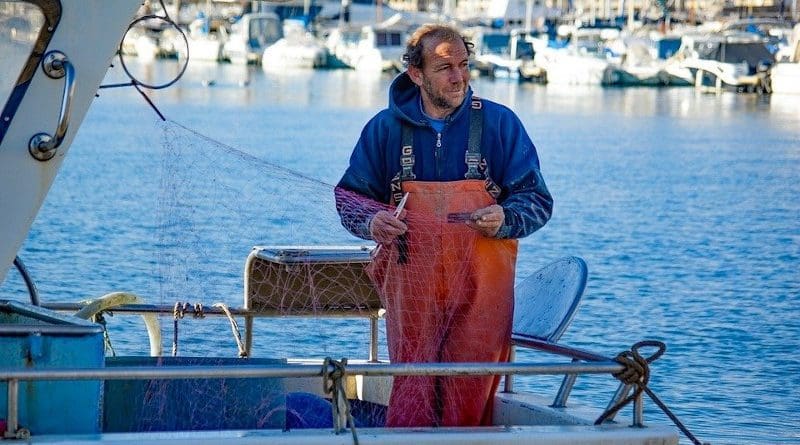Tensions Ease Over Britain-France Fishing Spat
By VOA
Tensions between Britain and France regarding fishing rights eased late Thursday as Britain withdrew two naval ships from the waters around the British island of Jersey where French fishermen had staged a protest.
Around two dozen French trawlers sailed to the island to demonstrate early Thursday, setting off flares and displaying banners demanding access to Jersey waters. The French fishermen said they were being prevented from accessing the waters around the British territory that lies just off the northern French coast.
“We come today because we have always fished in the waters there. We have always fished here, and then overnight, they take away all our fishing rights,” French trawlerman Ludovic Lazaro, who was among those taking part in the demonstration, told Agence France-Presse.
One French vessel briefly entered the main harbor on the self-governed island that is also a “Crown Dependency,” meaning Britain is responsible for the defense of the island.
Vessels deployed
Britain deployed two warships to the area to “monitor the situation,” while France deployed two maritime patrol vessels to French waters around Jersey. The British and French ships remained around 20 kilometers apart.
“Given the situation is resolved for now, the Royal Navy Offshore Patrol Vessels will prepare to return to port in the U.K.,” British Prime Minister Boris Johnson said in a statement. “We remain on standby to provide any further assistance to Jersey requests.”
Dimitri Rogoff, president of the fishing association in the French Normandy region, said “the show of force is over. Now, it’s politics that has to pick up the baton.”
Brexit fallout
Under Britain’s exit deal from the European Union, special provisions were included for the island’s fishing grounds, noted fisheries expert James Kane of the Institute for Government, a U.K. nonprofit group.
“French boats that were catching fish in Jersey waters for at least 10 days a year between 2017 and 2020 have the right to continue doing so on into the future,” Kane told VOA. “What it seems has happened is that the Jersey authorities have taken a very restrictive approach to proving that you were fishing and how much you were fishing in the last three years.”
Ian Gorst, external relations minister for the government of Jersey, insisted the correct regulations were being applied.
“The new post-Brexit trade deal is clear that evidence had to be provided of the nature and extent of historic fishing rights,” he told Sky News on Thursday. “We want to give French fishermen who can prove they have fished in our waters historically the rights that they had previously. But evidence has to be provided.”
Speaking to lawmakers in the National Assembly, French Maritime Minister Annick Girardin threatened to cut off Jersey’s electricity supply.
“We are ready to use these retaliatory measures,” Girardin said Tuesday. “Europe, France, has the means. It’s written into the agreement. So, as far as Jersey is concerned, I would remind you, for example, of the transport of electricity by submarine cables.”
Pledge to ‘iron out’ problems
British Minister for Business and Industry Nadhim Zahawi said Thursday that the government would seek a solution to the dispute.
“[We’ll] work together to make sure that operationally, on the ground, we iron out any issues, any problems, so that this historic deal between the United Kingdom and the EU, one of the most important deals we have struck, we’ve put in place, works for people, for communities, for the fishing communities,” Zahawi told Sky News.
Fishing makes up a fraction of 1% of British and European economies but remains a potent cultural and political force, said analyst James Kane.
“Fishermen are after all — in a modern economy — they’re the only people who are still hunter-gatherers,” Kane said.
“They go out and find food and bring it back. And so, there’s that kind of primal dimension to fishing that maybe makes it a bit sensitive,” he added. “In addition to that, it’s deeply rooted in coastal communities. People seem to care very much about it to a degree that is wildly disproportionate to its economic importance. And then, politically as well, it’s quite frankly useful for both sides to be pushing this story, because it has so much resonance.”
Analysts said tensions concerning fishing would likely continue as Britain seeks to fulfil its Brexit promise to “take back control” of its waters and borders.
Henry Ridgwell contributed reporting from London.

